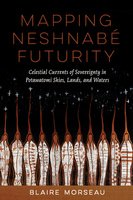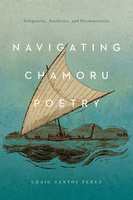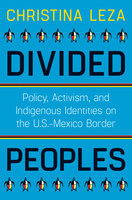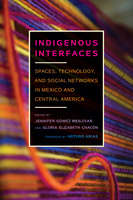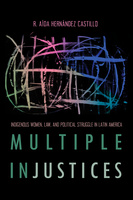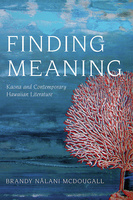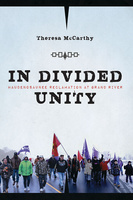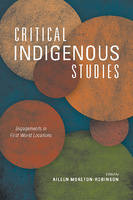Showing 1-15 of 21 items.
Mapping Neshnabé Futurity
Celestial Currents of Sovereignty in Potawatomi Skies, Lands, and Waters
The University of Arizona Press
Mapping Neshnabé Futurity is an essential read that offers a rethinking of how we conceive of futurity and sovereignty. Morseau’s interdisciplinary approach, blending anthropological research with literary critique, shows how counter-mapping projects both on the ground and in the skies reclaim space in the Great Lakes region—Neshnabé homelands—and are part of Anishinaabé/Neshnabé communities’ constellations of Indigenous futurities and stories of survivance.
From the Skin
Defending Indigenous Nations Using Theory and Praxis
The University of Arizona Press
In this edited volume, J. Jeffery Clark and Elise Boxer deploy the term practitioner-theorist to describe Indigenous studies graduates who theorize, produce, and apply knowledge within and between their nations and academia.
Navigating CHamoru Poetry
Indigeneity, Aesthetics, and Decolonization
The University of Arizona Press
For the first time, Navigating CHamoru Poetry focuses on Indigenous CHamoru (Chamorro) poetry from the Pacific Island of Guåhan (Guam). In this book, poet and scholar Craig Santos Perez navigates the complex relationship between CHamoru poetry, cultural identity, decolonial politics, diasporic migrations, and native aesthetics.
Divided Peoples
Policy, Activism, and Indigenous Identities on the U.S.-Mexico Border
The University of Arizona Press
Divided Peoples addresses the impact border policies have on traditional lands and the peoples who live there—whether environmental degradation, border patrol harassment, or the disruption of traditional ceremonies. Anthropologist Christina Leza shows how such policies affect the traditional cultural survival of Indigenous peoples along the border. The author examines local interpretations and uses of international rights tools by Native activists, counter-discourse on the U.S.-Mexico border, and challenges faced by Indigenous border activists when communicating their issues to a broader public.
La Raza Cosmética
Beauty, Identity, and Settler Colonialism in Postrevolutionary Mexico
The University of Arizona Press
La Raza Cosmética examines postrevolutionary identity construction as a project of settler colonialism that at once appropriated and erased indigeneity. In its critique of Indigenous representation, it also shows how Indigenous women strategically engaged with and resisted these projects as they played out in beauty pageants, films, tourism, art, and other realms of popular culture.
Girl of New Zealand
Colonial Optics in Aotearoa
The University of Arizona Press
Girl of New Zealand resurrects Māori women from objectification and locates them firmly within Māori whanau/families and communities.
Spiral to the Stars
Mvskoke Tools of Futurity
By Laura Harjo
The University of Arizona Press
Spiral to the Stars offers a critical and concrete map for community making that leverages Mvskoke way-finding tools of energy, kinship, knowledge, power, and spaces. It is must-have book for community organizers, radical pedagogists, and anyone wishing to empower and advocate for their community.
Indigenous Interfaces
Spaces, Technology, and Social Networks in Mexico and Central America
Edited by Jennifer Gómez Menjívar and Gloria Elizabeth Chacón
The University of Arizona Press
Indigenous Interfaces rejects the myth that Indigeneity and information technology are incompatible through its compelling analysis of the relationships between Indigenous peoples and new media. The volume illustrates how Indigenous peoples are selectively and strategically choosing to interface with cybertechnology, highlights Indigenous interpretations of new media, and brings to center Indigenous communities who are resetting modes of communication and redirecting the flow of information. It convincingly argues that interfacing with traditional technologies simultaneously with new media gives Indigenous peoples an edge on the claim to autonomous and sovereign ways of being Indigenous in the twenty-first century.
Transcontinental Dialogues
Activist Alliances with Indigenous Peoples of Canada, Mexico, and Australia
The University of Arizona Press
Transcontinental Dialogues presents innovative discussion, argument, and insight into the interactions between anthropologists and social researchers—both Indigenous and allies—as they negotiate together the terrain of the imposition of ongoing colonialism over Indigenous lives across three countries. The essays explore how scholars can recalibrate their moral, political, and intellectual actions to meet the obligations flowing from the decolonial alliances.
Multiple InJustices
Indigenous Women, Law, and Political Struggle in Latin America
The University of Arizona Press
R. Aída Hernández Castillo synthesizes twenty-four years of research and activism among indigenous women’s organizations in Latin America, offering a critical new contribution to the field of activist anthropology and anyone interested in social justice.
Finding Meaning
Kaona and Contemporary Hawaiian Literature
The University of Arizona Press
Winner of the Native American Literature Symposium’s Beatrice Medicine Award for Published Monograph.
The first extensive study of contemporary Hawaiian literature, Finding Meaning examines kaona, the practice of hiding and finding meaning, for its profound connectivity. Through kaona, author Brandy Nalani McDougall affirms the tremendous power of Indigenous stories and genealogies to give lasting meaning to decolonization movements.
The first extensive study of contemporary Hawaiian literature, Finding Meaning examines kaona, the practice of hiding and finding meaning, for its profound connectivity. Through kaona, author Brandy Nalani McDougall affirms the tremendous power of Indigenous stories and genealogies to give lasting meaning to decolonization movements.
In Divided Unity
Haudenosaunee Reclamation at Grand River
The University of Arizona Press
In February 2006, the Six Nations community of Caledonia, Ontario, occupied a 132-acre construction site, reigniting a 200-year struggle to reclaim land and rights in the Grand River region. Framed by intersecting themes of knowledge production, political resurgence, and the contributions of Haudenosaunee women, In Divided Unity provides a model for critical Indigenous theory that remains grounded in community-based concerns and actions.
Staking Claim
Settler Colonialism and Racialization in Hawai'i
By Judy Rohrer
The University of Arizona Press
Staking Claim analyzes Hawai‘i at the crossroads of competing claims for identity, belonging, and political status. Judy Rohrer argues that the dual settler colonial processes of racializing native Hawaiians (erasing their indigeneity), and indigenizing non-Hawaiians, enable the staking of non-Hawaiian claims to Hawai‘i.
Navajo Sovereignty
Understandings and Visions of the Diné People
Edited by Lloyd L. Lee; Foreword by Jennifer Nez Denetdale
The University of Arizona Press
A companion to Diné Perspectives: Revitalizing and Reclaiming Navajo Thought, each chapter of Navajo Sovereignty offers the contributors’ individual perspectives. This book discusses Western law’s view of Diné sovereignty, research, activism, creativity, and community, and Navajo sovereignty in traditional education. Above all, Lloyd L. Lee and the contributing scholars and community members call for the rethinking of Navajo sovereignty in a way more rooted in Navajo beliefs, culture, and values.
Critical Indigenous Studies
Engagements in First World Locations
Edited by Aileen Moreton-Robinson
The University of Arizona Press
Aileen Moreton-Robinson and the contributors to this important volume deploy incisive critique and analytical acumen to propose new directions for critical Indigenous studies in the First World. Leading scholars offer thought-provoking essays on the central epistemological, theoretical, political, and pedagogical questions and debates that constitute the discipline of Indigenous studies, including a brief history of the discipline.
Stay Informed
Subscribe nowRecent News

